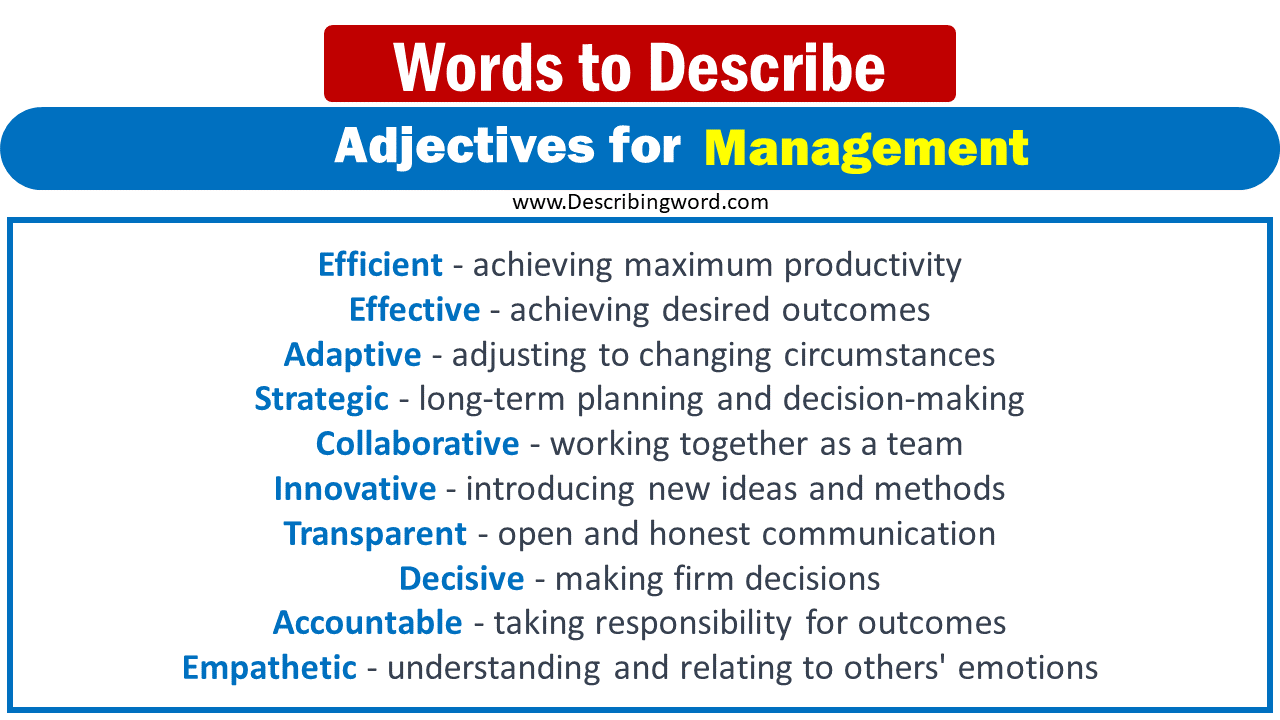Whether you’re in a leadership position or looking to take your career to the next level, having an understanding of what it means to be a good manager is essential. Management is more than just delegating tasks and making sure everything runs smoothly; a truly great manager carries qualities that help their team reach their goals and ultimately lead their company towards success.
In this blog post, we’ll explore some powerful adjectives for management that illustrate qualities needed for effective leadership styles. From compassion and creativity to strength and trustworthiness, these words will guide us as we dig into the foundations of successful management.
Here are 20 Most Popular Adjectives for Management:
- Efficient
- Effective
- Strategic
- Resourceful
- Skillful
- Competent
- Innovative
- Proactive
- Productive
- Dynamic
- Decisive
- Visionary
- Agile
- Empathetic
- Collaborative
- Inspirational
- Transparent
- Accountable
- Goal-oriented
- Adaptive
Discover More:

Words to Describe Management
Here are Some Useful Words to describe Management with Meanings;
- Efficient – achieving maximum productivity
- Effective – achieving desired outcomes
- Adaptive – adjusting to changing circumstances
- Strategic – long-term planning and decision-making
- Collaborative – working together as a team
- Innovative – introducing new ideas and methods
- Transparent – open and honest communication
- Decisive – making firm decisions
- Accountable – taking responsibility for outcomes
- Empathetic – understanding and relating to others’ emotions
- Organized – structured and systematic approach
- Motivational – inspiring and encouraging others
- Resilient – recovering quickly from setbacks
- Proactive – taking initiative and anticipating problems
- Resourceful – finding creative solutions
- Analytical – using data and information to make decisions
- Adaptable – flexible and open to change
- Agile – responsive and quick to adapt
- Inclusive – promoting diversity and inclusion
- Dynamic – constantly changing and evolving
Management Description Words
Here are Management Description words with Meanings in English;
- Goal-oriented – focused on achieving objectives
- Energetic – enthusiastic and active
- Inspiring – motivating and uplifting others
- Honest – truthful and transparent
- Decisive – making clear and firm decisions
- Empowering – enabling and supporting others
- Influential – having a significant impact
- Visionary – having a clear vision for the future
- Risk-tolerant – willing to take calculated risks
- Responsible – accountable for outcomes and actions
- Supportive – providing help and assistance
- Collaborative – working together towards a common goal
- Creative – generating new and innovative ideas
- Efficient – using resources effectively
- Leadership – guiding and directing others
- Motivating – inspiring and encouraging others
- Organizational – managing resources and processes
- Strategic – long-term planning and decision-making
- Systematic – following a structured approach
- Team-oriented – prioritizing teamwork and collaboration.
Adjectives for Management
Here is a Huge List of Adjectives that are used for Management:
- Agile
- Adaptable
- Analytical
- Approachable
- Assertive
- Authentic
- Authoritative
- Caring
- Charismatic
- Collaborative
- Committed
- Communicative
- Compassionate
- Competent
- Composed
- Confident
- Consistent
- Constructive
- Creative
- Critical
- Customer-focused
- Customer-oriented
- Decisive
- Delegative
- Democratic
- Detail-oriented
- Diligent
- Disciplined
- Driven
- Dynamic
- Effective
- Efficient
- Empathetic
- Encouraging
- Energetic
- Enthusiastic
- Entrepreneurial
- Ethical
- Experienced
- Expert
- Fair
- Farsighted
- Firm
- Flexible
- Focused
- Forward-thinking
- Friendly
- Goal-oriented
- Hardworking
- Helpful
- Honest
- Humble
- Humorous
- Imaginative
- Impartial
- Inspirational
- Innovative
- Insightful
- Inspiring
- Intelligent
- Intuitive
- Knowledgeable
- Leaderly
- Leading
- Logical
- Long-term
- Loyal
- Meticulous
- Motivating
- Natural
- Nurturing
- Observant
- Open-minded
- Optimistic
- Organized
- Outspoken
- Passionate
- Patient
- Perceptive
- Persuasive
- Personable
- Positive
- Pragmatic
- Precise
- Predictive
- Productive
- Professional
- Proactive
- Progressive
- Prudent
- Rational
- Realistic
- Reflective
- Resilient
- Resourceful
- Results-oriented
- Risk-taking
- Self-aware
- Strategic
- Supportive
- Systematic
- Talented
- Team-oriented
- Technically skilled
- Thorough
- Time-conscious
- Trustworthy
- Understanding
- Visionary
- Wise
FAQ’s
How would you describe Management?
Management can be defined as the process of achieving organizational goals by planning, organizing, leading and controlling resources. It involves setting objectives, developing strategies to achieve them, implementing the plans and evaluating their success. Management also includes the coordination of people and other resources in order to meet the desired objectives.
What is management in simple words?
Management can be simply described as the art of getting things done through people. It involves the use of resources to achieve organizational goals in an efficient and effective manner.
What are the natures of management?
Management has five core functions: planning, organizing, leading, directing and controlling. Planning involves setting objectives and developing strategies to achieve them. Organizing is the process of allocating resources to carry out plans. Leading involves motivating people to work together towards a common goal. Directing involves giving instructions and guidance to employees in order to achieve desired results. Lastly, controlling involves tracking progress and making adjustments to ensure that objectives are met.